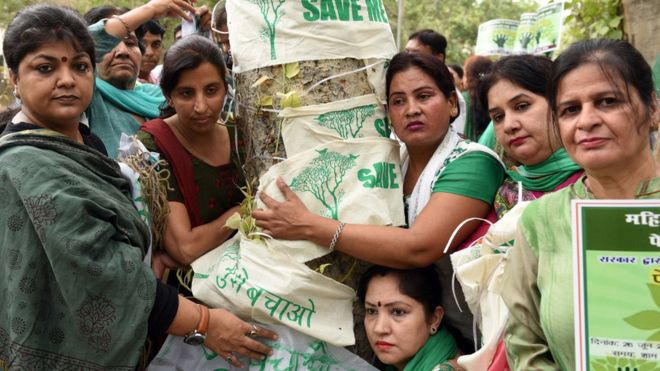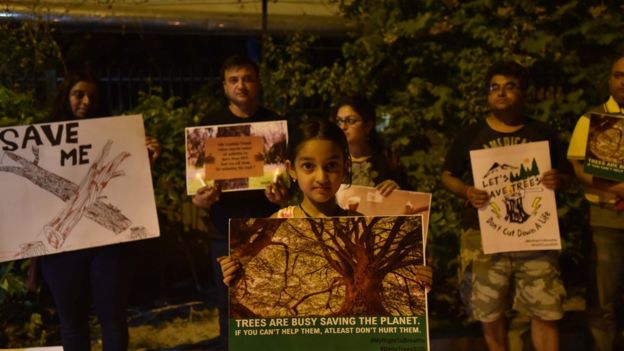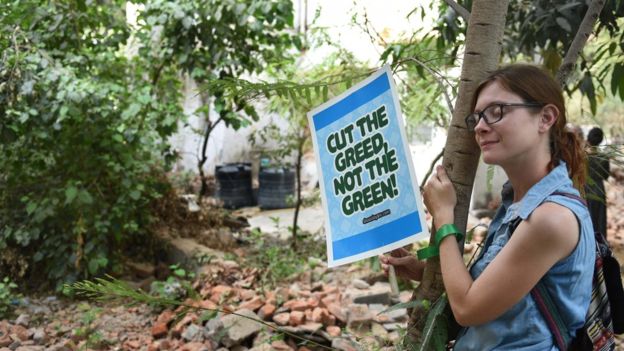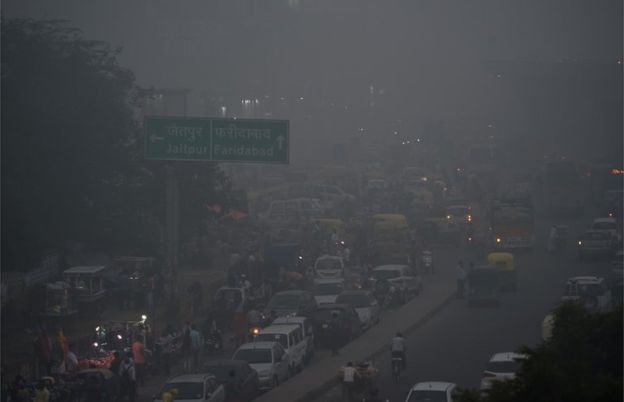
A citizen-led movement in India’s capital Delhi has successfully halted the cutting of more than 16,000 trees in the city. The BBC’s Nikita Mandhani talked to some people actively involved in this movement.
Juhi Saklani, 48, recounts how horrified she felt when she first heard about a government proposal to cut thousands of trees in the heart of Delhi to build houses for government employees.
“Some of us who love trees and feel strongly about the connection of trees with pollution felt that this was a criminally wrong plan,” says Ms Saklani, adding that this was what forced her to become a “citizen activist”.
Delhi is one of the world’s most polluted cities, with air quality frequently reaching hazardous levels. The one mitigating factor is that large parts of the city still have a substantial green cover, although this has also been depleting due to development projects.
- Delhi’s air pollution is triggering a health crisis
- Why isn’t Delhi on pollution red alert?
- Can Delhi ever clean up its foul air?
The latest plan to cut thousands of trees across seven Delhi neighbourhoods had actually been approved in July 2016. But the news only became public in June 2018 after media reports highlighted that about 11,000 trees were due to be felled in a single neighbourhood.
Almost overnight, hundreds of residents, including environmental and anti-pollution organizations, formed a collective to fight against it.

Activists began mobilizing opinion and people. The movement gained traction on social media and messaging apps like WhatsApp, inspiring more than 1,000 people to protest in various ways.
These ranged from sit-ins to tree-climbing workshops, candle-light vigils, meditation protests, tree plantation activities and all-day patrolling efforts to keep a watch on the trees.
For Delhi-based environmentalist Vimlendu Jha, this movement became a key part of his “green activism”.
Mr. Jha is the founder of Swecchha, a non-profit organization that works on environmental and youth issues, and he has consistently led and participated in activities to make Delhi more “liveable”. As someone who has planted thousands of trees across Delhi over the years, he felt that the government’s plan violated citizens’ right to clean air.
“The government is the custodian of citizens’ rights and the environment,” he said, adding that instead of taking steps to “take us out of this environmental hazard”, the government was only making it worse.

Verhaen Khanna, an environmentalist who started a social media collective called the New Delhi Nature Society, agreed.
“None of the existing trees should be cut as they’re living ecosystems within themselves,” he said.
Over the past few years, Mr. Khanna has been trying to cure “tree blindness”, a “disease” which he says is prominent in big cities – that people have no idea about the natural beauty around them. He regularly leads workshops and activities related to climbing trees, meditating under them, walking barefoot on grass plains and trekking across Delhi’s lesser-known forested areas.
“It’s a really devastating thing to happen to everybody in this city of almost 20 million people. Losing so many trees is catastrophic,” he added.

Taken by surprise at the vehemence of public reaction, India’s federal government retaliated. First, they said that “only 14,000 trees were to be cut”. They then promised to plant 10 saplings for every tree that is cut under what they called measures for “compensatory afforestation”.
Ms. Saklani called the announcement “an incredible hogwash”, pointing out that the survival rate for saplings in India is “dismal”.
“Also, how does it help if the saplings are planted 30km away from these neighbourhoods?”
Mr. Khanna also dismissed the government’s justification and reparation plans.
“They don’t realize half a century or a full century is gone in creating those organisms using the country’s natural resources,” he said.
Then on 28 June, the country’s housing and urban affairs minister tweeted that “no trees will henceforth be cut in the process of redevelopment of Delhi colonies”.
I have always maintained that the green cover in Delhi will not be damaged & steps will be taken to enhance it even further.
As stated earlier, no trees will henceforth be cut in the process of redevelopment of Delhi colonies. (1/3) pic.twitter.com/NrIKIcNlN6
— Hardeep Singh Puri (@HardeepSPuri) June 28, 2018
“We will revisit our urban design in such a way we don’t have to cut the trees,” Housing and Urban Affairs Secretary Durga Shanker Mishra told the BBC.
“We may lose some build-up area for the sake of the environment.”
But by then, two separate petitions against the government had been filed in the high court and the National Green Tribunal (NGT), an environmental court. Both stayed the government project.
Then on 4 July, the high court dealt it a definitive blow, saying no trees could be cut in the entire city of Delhi till further orders. It said it would “not allow Delhi to die at the cost of the redevelopment projects”.

Dr. Kaushal Kant Mishra, an orthopaedic surgeon, who filed the successful petition in the high court, is the president and founder of Youth for Equality, a non-profit working towards creating equal opportunities and good governance in the country.
He has filed numerous petitions in the court against caste-based discrimination and women’s rights, but this is Mr. Mishra’s first environmental fight.
“I had never expected this movement to become so popular,” he added, noting that Delhi’s high pollution levels had forced many people to join this tussle against the government.
Dr. Mishra and other activists welcomed the court’s decision as a victory for the people of Delhi against the authorities.
A BIG BIG day for citizens of Delhi. All tree fellings banned till further orders, with regard to NBCC projects
— Vimlendu Jha (@vimlendu) July 4, 2018
Delhi High Court bans felling of trees in Delhi till further orders, no permissions to be granted in the future too. Court also said,”East Kidwai Nagar will be demolished if need be, as it seems to be haphazard & doesn’t consider density and impact on neighbouring hospitals too.”
— Alka Lamba (@LambaAlka) July 4, 2018
But activists are still worried.
They say that despite previous orders, government contractors are still cutting and uprooting trees. In fact, Mr. Jha had filed a “contempt of court” case after witnessing one such incident himself.
Dear @HardeepSPuri @LtGovDelhi @DelhiPolice There is tree cutting happening as we speak in Sarojini Nagar. Please please take immediate action. pic.twitter.com/IARlx1eV48
— Vimlendu Jha (@vimlendu) June 29, 2018
So, they don’t want to stop yet. They say Delhi needs more greenery and less pollution and that will be possible only when the city’s residents become more aware and active – if not, it will become too easy for authorities to keep cutting trees in the guise of various projects.
They are now focused on educating the population, especially children, about the importance of trees and how cutting them would adversely affect the environment.




